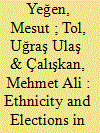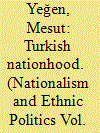| Srl | Item |
| 1 |
ID:
175138


|
|
|
|
|
| Summary/Abstract |
Relying on a survey conducted in 2014 in 12 provinces in eastern Turkey, this article analyses the extent to which (a) ethnicity and religiosity shape Kurds’ electoral choices and (b) the Kurds in the East support the demand for education in Kurdish and the demand for self-rule for Kurds. The findings demonstrate that ethnicity is an important factor in shaping Kurds’ electoral choices and that the demands for education in Kurdish language and self-rule are backed not only by the vast majority of those Kurds who support the pro-Kurdish party but also by a significant number of those Kurds who support the AK Party.
|
|
|
|
|
|
|
|
|
|
|
|
|
|
|
|
| 2 |
ID:
154459


|
|
|
|
|
| Summary/Abstract |
This article challenges two established views in the literature on Turkish nationalism. First, that Turkish nationhood in the early republican era was civic and ethnic and, second, that, while Turkish nationhood was inclusive and egalitarian in constitutional texts, in the early years of the Turkish Republic and in the case of Turkish citizens of Muslim origin, it became exclusive or discriminatory in citizenship practices once the Republic was consolidated and in the case of non-Muslim Turkish citizens. Contra these two established views, I first argue that Turkish nationhood was not civic and ethnic, but it was actually civic and ancestral and cultural. Secondly, relying on an examination of legal texts produced and citizenship practices pursued in the years between 1918 and 1924, I argue that the Turkish nationhood was exclusive and discriminatory both theoretically and practically, on paper as well as in practice, both at the time of the foundation of the republic and once the regime had become consolidated.
|
|
|
|
|
|
|
|
|
|
|
|
|
|
|
|